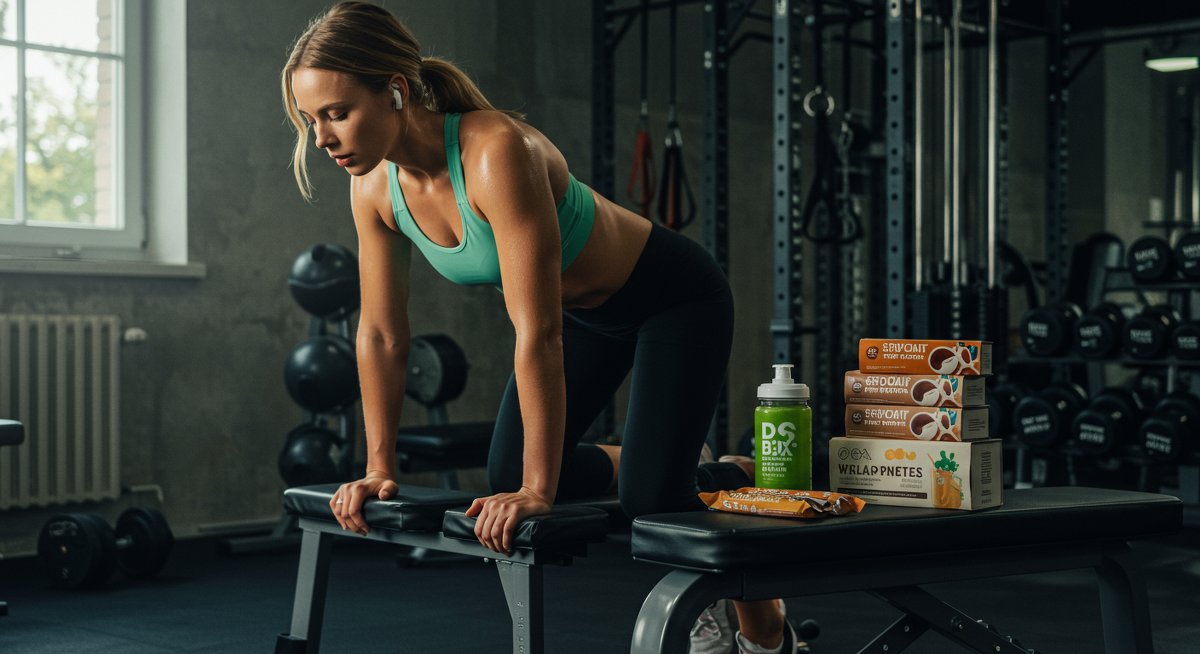
Are you ready to unlock your ultimate fitness potential while embracing a compassionate lifestyle? Vegan fitness is more than just a trend; it's a powerful approach to fueling your workouts, building muscle, and enhancing overall health. This comprehensive guide is designed for vegan athletes and fitness enthusiasts, offering actionable strategies, tips, and meal ideas to help you thrive on a plant-based diet. Let's dive in!
Why Vegan Fitness Matters for Athletes and Fitness Enthusiasts
Choosing a vegan lifestyle can offer many benefits for fitness, including improved recovery times, enhanced endurance, and reduced inflammation. It can be a surprisingly effective way to fuel your body, allowing you to push your limits and achieve your athletic goals. A well-planned vegan diet provides all the essential nutrients needed for optimal performance. Vegan athletes often report feeling lighter, more energetic, and experiencing faster muscle recovery compared to those who consume animal products. It's a great way to align your values with your fitness aspirations.
Here’s where it gets interesting: veganism encourages a deeper understanding of nutrition. You become more mindful of what you put into your body, from the quality of your protein sources to the importance of nutrient timing.
Here are some real-world examples of why vegan fitness matters:
- Example 1: Endurance Athletes: Consider marathon runners. A vegan diet, rich in complex carbohydrates and antioxidants, can provide sustained energy and reduce oxidative stress during long-distance runs. By focusing on whole foods, runners can ensure they're getting the nutrients they need without the heavy feeling that can sometimes come from processed foods.
- Example 2: Strength Training: Weightlifters can benefit from the high-protein intake possible with vegan diets. Sources like lentils, tofu, and vegan protein powders support muscle repair and growth. Focusing on these nutrient-dense foods can give weightlifters a serious edge.
- Example 3: Cross-Training: Individuals engaged in activities like CrossFit or HIIT (High-Intensity Interval Training) can use vegan nutrition to improve recovery. The anti-inflammatory properties of plant-based foods can help reduce muscle soreness and promote faster healing, allowing for more frequent and intense training sessions.
Essential Steps to Get Started with Vegan Fitness
Starting your vegan fitness journey requires careful planning. It’s not just about cutting out animal products; it’s about replacing them with nutrient-rich alternatives. Proper planning ensures you get the right amount of protein, carbohydrates, and fats to support your workouts and overall health.
Here’s a step-by-step guide to help you get started:
- Assess Your Current Diet: Before making any changes, evaluate what you currently eat. Identify the areas where you consume animal products and start brainstorming plant-based alternatives. Make a list of your favorite meals and start thinking about how to veganize them.
- Educate Yourself: Learn about essential nutrients, such as protein, iron, vitamin B12, and omega-3 fatty acids, and their vegan sources. Understanding these nutrients will help you make informed food choices. Websites, books, and registered dietitians specializing in vegan nutrition are valuable resources.
- Plan Your Meals: Meal planning is crucial. Create weekly meal plans, including breakfast, lunch, dinner, and snacks. This helps you stay organized and ensures you’re getting a balanced intake of nutrients.
- Stock Your Kitchen: Fill your pantry and refrigerator with plant-based staples like whole grains, legumes, fruits, vegetables, nuts, and seeds. Having these ingredients on hand makes it easier to prepare quick and healthy meals.
- Track Your Progress: Monitor your energy levels, workout performance, and overall well-being. Keeping a food diary can help you identify areas where you may need to adjust your diet. Listen to your body and make changes as needed.
Example 1: Planning a Week of Meals A vegan athlete can plan a week of meals that incorporates a variety of plant-based protein sources. Monday might feature a tofu scramble with whole-wheat toast for breakfast and a lentil and vegetable curry for dinner. Tuesday could include a smoothie with plant-based protein for a pre-workout boost, and a quinoa salad with chickpeas and roasted vegetables for lunch. By varying your food choices, you can ensure you're getting all essential nutrients.
Example 2: Simple Vegan Swaps Start with simple swaps. Replace dairy milk with almond, soy, or oat milk. Substitute eggs in baking with flaxseed meal (1 tablespoon flaxseed meal mixed with 3 tablespoons of water). Swap meat in tacos or pasta sauces for crumbled tempeh or plant-based ground "meat". These small changes can make the transition easier and more enjoyable.
Example 3: Protein-Packed Snacks: Keep protein-rich snacks on hand, such as a handful of almonds (about 6 grams of protein per serving), a protein shake with plant-based powder, or edamame (about 18 grams of protein per cup). This will help you meet your protein needs, especially after workouts.
Common beginner questions answered
- Where do I get my protein? Plant-based protein sources are plentiful. Include foods like lentils, beans, tofu, tempeh, edamame, quinoa, nuts, seeds, and vegan protein powders in your diet.
- Will I get enough iron? Iron-rich vegan foods include spinach, lentils, fortified cereals, and dried fruits. Pair these foods with vitamin C-rich foods to enhance iron absorption.
- Do I need to take supplements? Most vegans need to supplement vitamin B12, as it’s primarily found in animal products. Consider other supplements like vitamin D, omega-3 fatty acids, and creatine, depending on your individual needs.
Nutritional Considerations for Vegan Athletes
Nutrition is the cornerstone of vegan fitness. You need to ensure you consume enough protein, carbohydrates, fats, vitamins, and minerals to support your training. When it comes to vegan athletes, it's all about having the right fuel for performance.
- Protein: Adequate protein intake is essential for muscle repair and growth. Vegan sources include tofu, tempeh, lentils, beans, quinoa, nuts, seeds, and vegan protein powders. Aim for 1.2 to 2.0 grams of protein per kilogram of body weight per day, depending on your training intensity.
- Carbohydrates: Carbs provide energy for workouts. Focus on complex carbohydrates like whole grains (brown rice, oats, quinoa), fruits, and vegetables. These foods release energy gradually, providing sustained fuel for your body.
- Fats: Healthy fats are vital for hormone production and overall health. Incorporate sources like avocados, nuts, seeds, and olive oil into your diet. Be mindful of portion sizes, as fats are calorie-dense.
- Vitamins and Minerals: Pay close attention to vitamins B12, D, iron, calcium, and omega-3 fatty acids. Consider supplementation or fortified foods to meet your needs.
Example 1: Planning High-Protein Meals Create a high-protein meal plan incorporating several plant-based sources throughout the day. Breakfast could be a tofu scramble with spinach and whole-wheat toast. Lunch could be a large salad with quinoa, chickpeas, and a tahini dressing. Dinner could feature a lentil stew with brown rice. This approach ensures a consistent protein intake throughout the day, supporting muscle recovery.
Example 2: Supplement Strategies Explore various supplements. Consider taking a B12 supplement, as it's crucial for nerve function and red blood cell production. If you're training intensely, a creatine supplement can help improve strength and power. Additionally, omega-3 supplements derived from algae can support heart health and reduce inflammation. Always consult a healthcare professional before starting any new supplements.
Example 3: Nutrient-Dense Snack Ideas: Keep snacks that are both nutritious and easy to prepare. For instance, a protein shake with plant-based protein powder, a handful of almonds, or edamame are perfect choices for providing energy and supporting muscle recovery. These snacks help keep you full and provide necessary nutrients between meals.
Tips for Success in Vegan Fitness
- Meal Planning: Plan your meals in advance. Meal planning helps you ensure you consume balanced meals and avoid impulsive food choices. You can prepare meals for the week on weekends or batch-cook ingredients like grains and legumes.
- Label Reading: Become a master of reading food labels. Pay attention to protein, carbohydrate, fat, and micronutrient content. Look for hidden animal products in processed foods, and choose foods with minimal additives.
- Hydration: Drink plenty of water throughout the day. Proper hydration is critical for workout performance and recovery. Consider adding electrolytes if you sweat heavily during your workouts.
- Listen to Your Body: Pay attention to how your body feels. Adjust your diet and training based on your energy levels, recovery times, and overall well-being. If you experience persistent fatigue or any other symptoms, consult a healthcare professional.

Finding Community and Support
Joining a community of fellow vegan athletes can provide invaluable support and motivation. It can be a great way to share recipes, workout tips, and encouragement. There are many online and offline communities dedicated to vegan fitness.
- Online Forums and Social Media: Join online forums and social media groups to connect with other vegan athletes. Share your experiences, ask questions, and get inspired by others' success stories.
- Local Vegan Groups: Search for local vegan groups in your area. Many groups organize potlucks, group workouts, and educational events. Meeting others in person can provide a strong sense of community.
- Vegan Fitness Coaches and Trainers: Consider working with a vegan fitness coach or trainer. They can provide personalized guidance, create customized meal plans, and help you reach your fitness goals. They can also help you navigate any challenges or questions that arise during your fitness journey.
Quick & Easy Vegan Swaps
Making simple swaps can make your transition to vegan fitness much easier. Here are some ideas for quick and easy changes:
- Dairy Milk: Replace dairy milk with unsweetened almond, soy, or oat milk in your smoothies, cereal, and coffee.
- Eggs: Use flaxseed meal (1 tablespoon mixed with 3 tablespoons of water) as an egg replacement in baking. You can also find commercial egg replacers.
- Meat: Swap meat in tacos or pasta sauces for plant-based ground "meat," lentils, or crumbled tempeh.
- Cheese: Use nutritional yeast for a cheesy flavor in sauces and on popcorn, or try one of the many delicious vegan cheese alternatives from Miyoko's Kitchen.
Next Steps in Your Vegan Fitness Journey
- Experiment with Recipes: Try new recipes and explore different cuisines. Discovering delicious and diverse vegan meals can make your fitness journey more enjoyable. Online resources and cookbooks offer endless inspiration.
- Track Your Progress: Monitor your workouts, body composition, and energy levels. Track your progress to stay motivated and adjust your strategy as needed. Use fitness trackers or apps to monitor your workouts and progress.
- Stay Informed: Continue learning about vegan nutrition and fitness. The more you know, the better equipped you’ll be to succeed. Stay up-to-date on the latest research and trends in vegan fitness.
Expert-Level Vegan Living Insights
As you advance in your vegan fitness journey, you may want to explore advanced techniques and strategies. This includes optimizing your nutrient timing, experimenting with various supplements, and fine-tuning your training plan. One area to consider is nutrient timing. Consuming protein and carbohydrates shortly after workouts can help with muscle recovery and glycogen replenishment. Experimenting with different protein sources, such as pea protein, soy protein, or brown rice protein, can help you find what works best for your body. Many athletes also benefit from using pre-workout supplements to boost energy levels during workouts.
Conclusion
Embracing vegan fitness is an exciting and rewarding journey. It’s not just about what you eat; it's about adopting a holistic approach that supports your health, performance, and ethical values. By following the tips and strategies outlined in this guide, you can unlock your fitness potential and thrive as a vegan athlete. Remember to be patient with yourself, celebrate your successes, and enjoy the process. If you're ready to take your fitness to the next level, the world of plant-based possibilities awaits.
If you're on this journey too, I’d love to hear how it goes for you.